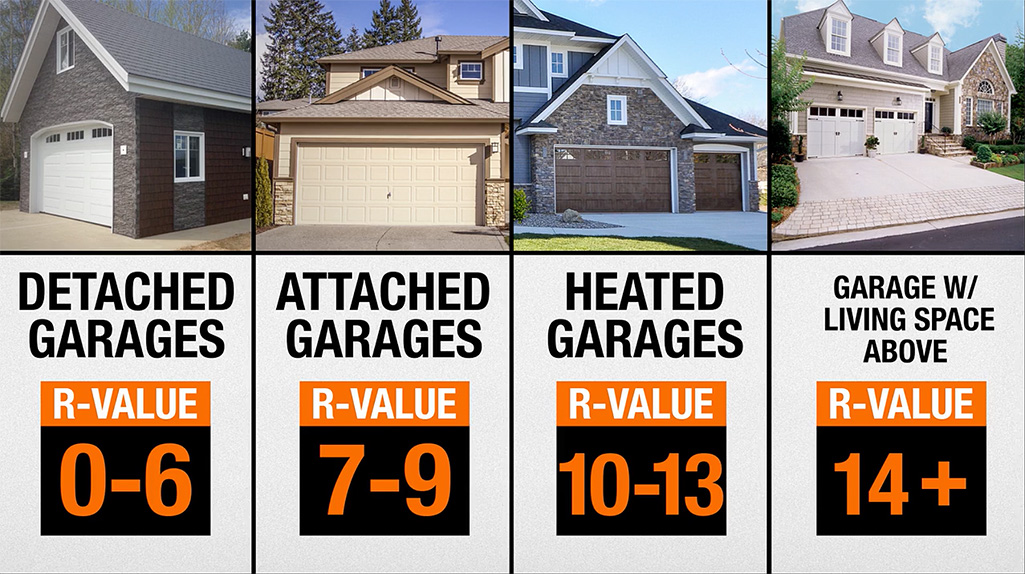Looking to choose the right insulation material for your garage door? Well, you’re in the right place! When it comes to keeping your garage comfortable and energy-efficient, the insulation material you choose plays a crucial role. But don’t worry, we’ve got you covered! In this guide, we’ll explore everything you need to know about selecting the perfect garage door insulation material. So let’s dive in and find the best solution for your needs!
Insulating your garage door has many benefits, such as improving energy efficiency and reducing noise transmission. But how do you make the right choice among the different insulation materials available? Don’t fret – we’ll break it down for you. From traditional options like fiberglass and foam board to newer alternatives like reflective foil and polyurethane foam, we’ll discuss the pros and cons of each material.
But wait, there’s more! We’ll also consider factors like R-value, installation process, and budget considerations to help you make an informed decision. With our expert guidance, you’ll be well-equipped to choose the right garage door insulation material that suits your specific needs and preferences. So let’s get started on this exciting journey of enhancing your garage’s functionality and comfort!
- Identify your insulation needs based on climate and personal preference.
- Research different insulation options such as fiberglass, foam board, or reflective insulation.
- Consider factors like R-value, ease of installation, and moisture resistance.
- Read reviews and gather feedback from other homeowners to inform your decision.
- Consult with a professional to ensure the chosen insulation material is compatible with your garage door.
Choosing the correct garage door insulation material is crucial for energy efficiency and temperature control. Follow these steps to make an informed decision based on your specific needs. Remember to assess factors like climate, insulation types, and customer reviews to ensure the right insulation material for your garage door. Consulting with a professional will guarantee a proper fit and installation.
:max_bytes(150000):strip_icc()/types-of-garage-installation-1398128-1f388b54b4e94218abbd7ebb1d8bae33.png)
How to Choose the Right Garage Door Insulation Material: A Comprehensive Guide
Having proper insulation for your garage door is essential for maintaining energy efficiency, reducing noise, and creating a comfortable environment. With so many insulation materials available on the market, choosing the right one can be overwhelming. In this comprehensive guide, we will explore the different factors to consider when selecting garage door insulation material to help you make an informed decision. From R-value to material types, we’ve got you covered! Read on to find out everything you need to know about choosing the right garage door insulation material.
Factors to Consider When Choosing Garage Door Insulation Material
When it comes to selecting the right insulation material for your garage door, several factors should be taken into consideration. Let’s take a closer look at each of these factors and how they can influence your decision-making process.
1. R-Value: Understanding the Insulation’s Effectiveness
The R-value is a measure of an insulation material’s effectiveness in resisting heat flow. It indicates how well the material can insulate your garage door and prevent the transfer of heat. The higher the R-value, the better the insulation’s thermal resistance. When choosing garage door insulation material, consider the climate in your area. If you live in a colder climate, opt for insulation with a higher R-value to provide maximum thermal insulation.
Beyond the R-value, also consider the weather conditions specific to your area. If you experience extreme temperature variations or strong winds, a higher R-value insulation material will provide better protection.
Additionally, take into account the size and design of your garage door. Larger doors with more surface area may require insulation with a higher R-value to ensure efficient insulation.
2. Material Types: Exploring Your Options
Gone are the days when insulation options were limited to fiberglass batts. Nowadays, there are several materials available for garage door insulation. Let’s take a look at some of the most commonly used insulation materials:
- Fiberglass: Fiberglass is a popular choice due to its affordability and versatility. It is available in batts or rolls and offers good thermal performance.
- Polystyrene: Polystyrene insulation panels are lightweight and offer excellent thermal resistance. They provide good soundproofing and are resistant to moisture.
- Polyurethane: Polyurethane foam insulation is known for its high R-value and superior thermal performance. It is durable and offers effective sound insulation.
- Reflective Foil Insulation: Reflective foil insulation is a radiant barrier that reflects heat rather than absorbing it. It is great for reducing radiant heat transfer and works well in hot climates.
3. Cost Considerations: Finding the Balance
When choosing garage door insulation material, it is important to consider your budget. While some materials may offer better insulation performance, they may also come with a higher price tag. Evaluate your insulation needs and strike a balance between the desired R-value and the cost of the material. Remember, the long-term energy savings provided by efficient insulation may offset the initial expense.
It’s also worth considering the installation costs. Some insulation materials require professional installation, while others can be easily installed as a DIY project. Keep this in mind when making your decision, as professional installation can add to the overall cost.
Lastly, take into account the durability and lifespan of the insulation material. Investing in a high-quality insulation material may save you money in the long run due to its longer lifespan and better performance.
4. Moisture Resistance: Protecting Against Condensation
Garages can be prone to moisture buildup, which can lead to mold and mildew growth. When choosing insulation material, opt for options that offer good moisture resistance. Materials like polyurethane foam and polystyrene are known for their resistance to moisture absorption, making them ideal choices for garage door insulation.
Additionally, consider insulation options that provide vapor barriers to prevent the buildup of moisture within the insulation layers. This can help maintain the integrity and effectiveness of the insulation material over time.
5. Installation Process: DIY or Professional Help?
Take into consideration your DIY skills and the complexity of the installation process when choosing garage door insulation material. Some materials, like fiberglass batts, can be easily installed as a DIY project, while others may require professional assistance.
If you are not well-versed in insulation installation, it might be worth hiring a professional to ensure proper installation and optimal performance of the insulation. Professional installers have the expertise and tools necessary to install the material accurately, saving you time and potentially preventing any installation mishaps.
Moreover, if your garage door has unique design features or requires custom cutting of the insulation material, professional help may be the best option.
6. Aesthetics: Enhancing the Look of Your Garage
While the main purpose of garage door insulation is to provide energy efficiency, don’t forget to consider the aesthetic aspect. Some insulation materials may alter the appearance of your garage door, while others are more discreet.
If maintaining the original look of your garage door is important to you, look for insulation materials that can be easily hidden or integrated seamlessly into the door’s design. Keep in mind that certain materials may require additional framing or coverings, which could impact the overall appearance of the door.
Additionally, consider the color options available for the insulation material. Some materials offer a range of colors, allowing you to choose one that matches or complements your garage door’s color.
7. Maintenance and Longevity: Ensuring a Lasting Solution
Lastly, consider the maintenance requirements and longevity of the insulation material. Different materials have varying levels of maintenance needs. Some may require regular cleaning or inspection to ensure their efficiency and longevity.
Research the recommended maintenance practices for the insulation material you are considering and assess whether it aligns with your maintenance capabilities and preferences. Additionally, look for materials that offer good durability and have a long lifespan to ensure you get the most out of your investment.
Additional Tips for Choosing the Right Garage Door Insulation Material
Now that we have explored the key factors to consider when choosing garage door insulation material, here are some additional tips to help you make the best decision:
1. Consult with Professionals:
If you’re unsure about which insulation material is best for your garage door, consult with professionals. They can assess your garage door and provide expert advice on the most suitable options based on your specific needs and budget.
2. Read Customer Reviews:
Before purchasing any insulation material, take the time to read customer reviews and ratings. These can provide insights into the performance, quality, and ease of installation of different insulation options.
3. Consider the Environmental Impact:
For environmentally-conscious individuals, consider insulation materials that are eco-friendly. Look for options made from recycled materials or those that have minimal impact on the environment during production and disposal.
4. Seek Energy Efficiency Certifications:
Look for insulation materials that carry energy efficiency certifications, such as ENERGY STAR®. These certifications indicate that the product has been tested and meets specific energy-saving standards.
5. Take Noise Reduction into Account:
If reducing noise is important to you, consider insulation materials known for their soundproofing capabilities. Materials like polyurethane foam and reflective foil insulation can help minimize noise transmission.
6. Don’t Neglect the Garage Walls:
While the focus of this guide is on garage door insulation, don’t forget about insulating other areas of your garage, such as the walls. Proper insulation throughout the entire garage will enhance energy efficiency and create a comfortable environment.
7. Regularly Inspect and Maintain the Insulation:
Once you’ve chosen and installed the insulation material, make it a habit to regularly inspect and maintain it. Check for any signs of damage or degradation and address them promptly to ensure optimal insulation performance.
By carefully considering the factors mentioned above and following these additional tips, you can confidently select the right garage door insulation material that meets your needs, preferences, and budget. Remember, proper insulation not only improves energy efficiency but also enhances the overall comfort and functionality of your garage.
Key Takeaways: How to Choose the Right Garage Door Insulation Material?
- Consider the R-value of the insulation material – higher values indicate better insulation.
- Think about the climate in your area – choose materials that are suitable for hot or cold weather.
- Check for durability – opt for materials that can withstand wear and tear.
- Look for easy installation options – choose materials that are DIY-friendly if you plan to install them yourself.
- Consider the cost – compare prices and choose a material that fits your budget.
Frequently Asked Questions
Welcome to our Frequently Asked Questions section where we’ll provide answers to some common queries about choosing the right garage door insulation material. Read on to find out more!
1. What factors should I consider when choosing a garage door insulation material?
When selecting the right insulation material for your garage door, there are a few important factors to keep in mind. First, consider the R-value, which measures the insulation’s effectiveness. You’ll want to choose a material with a high R-value for optimal insulation. Secondly, think about the climate in your area. Different regions have different temperature fluctuations, so you’ll need insulation that can withstand those conditions. Lastly, consider factors like durability, ease of installation, and cost to ensure you make the best choice for your needs.
By taking all of these factors into consideration, you can choose a garage door insulation material that provides excellent thermal insulation, is suited to your climate, and fits your budget and installation requirements.
2. What are the most common types of insulation materials for garage doors?
There are a few commonly used insulation materials for garage doors. One popular option is polystyrene foam boards, which are lightweight, easy to install, and offer good insulation. Another common choice is polyurethane foam, which provides excellent thermal resistance and can enhance the structural integrity of the door. Fiberglass insulation is also frequently used, as it is cost-effective and readily available. Reflective foil insulation is another option, which helps to reflect heat away from the garage. Be sure to consider the pros and cons of each material before making your decision.
Each type of insulation material has its advantages and disadvantages, so it’s a good idea to research and compare them to determine which one best suits your needs in terms of insulation performance, cost, and ease of installation.
3. Is it necessary to insulate a garage door?
Insulating your garage door is not always necessary, but it can provide several benefits. Insulation helps regulate the temperature inside your garage, keeping it cooler in the summer and warmer in the winter. This can be particularly beneficial if you use your garage as a workshop, storage space, or if it is adjacent to your home. Insulation can also help reduce noise from the outside, making your garage more comfortable and peaceful. Additionally, insulated garage doors can improve energy efficiency, potentially lowering your heating or cooling costs.
Ultimately, the decision to insulate your garage door depends on your specific needs, budget, and the climate in your area. If you live in an extreme climate or use your garage frequently, insulating the door may be a worthwhile investment.
4. Can I install garage door insulation myself or do I need a professional?
Installing garage door insulation can typically be done as a DIY project. Many insulation materials are designed for easy installation, and manufacturers often provide detailed instructions. However, it’s important to carefully follow the instructions and take necessary safety precautions, especially if you’re working with materials that require cutting or fitting. If you’re unsure or uncomfortable with the installation process, it’s best to consult a professional. They have the expertise and tools to ensure proper insulation installation, and it can save you time and potential headaches in the long run.
Remember, safety should always be a top priority, so if you’re uncertain about handling the insulation yourself or have a complex garage door system, it’s worth reaching out to a professional for assistance.
5. Are there any maintenance tips for garage door insulation?
Maintaining your garage door insulation is relatively simple. Regularly inspect the insulation for any signs of damage or wear and tear, such as cracks or gaps. If you notice any issues, address them promptly to ensure optimal insulation performance. Additionally, keep the garage door clean and clear of any debris that may impede the insulation or the movement of the door. Lastly, monitor the R-value of your insulation material over time, as it may decrease with age. If necessary, consider replacing the insulation to maintain its effectiveness.
By regularly checking and maintaining your garage door insulation, you can prolong its lifespan and ensure it continues to provide the desired thermal and energy-saving benefits for years to come.

Summary:
Choosing the right garage door insulation material is important for saving energy and reducing noise. Different materials offer different benefits.
In order to make the best choice, consider factors like R-value, cost, and availability. Foam board insulation is a popular option due to its high R-value and affordable price. Reflective foil insulation is also effective for reducing heat transfer. Fiberglass batt insulation is a good choice for DIY installation. Ultimately, the right material will depend on your specific needs and budget.

